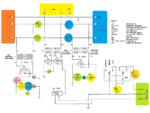phatcreators
Full Member level 5

How to make (build) ATS (Automatic Transfer Switch) ?
I want to switch off my generator's output power & switch on the electricity (provided by the Govt) when the electricity shortage (outage) is over . Can i make that circuit ?
Also, if i want to completely shut off the generator then can it be done too ?
I want to switch off my generator's output power & switch on the electricity (provided by the Govt) when the electricity shortage (outage) is over . Can i make that circuit ?
Also, if i want to completely shut off the generator then can it be done too ?



